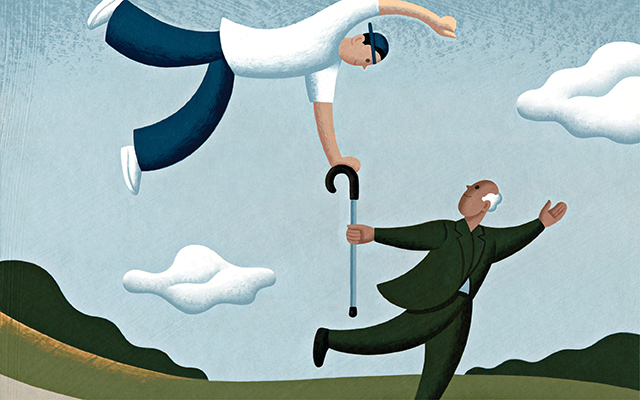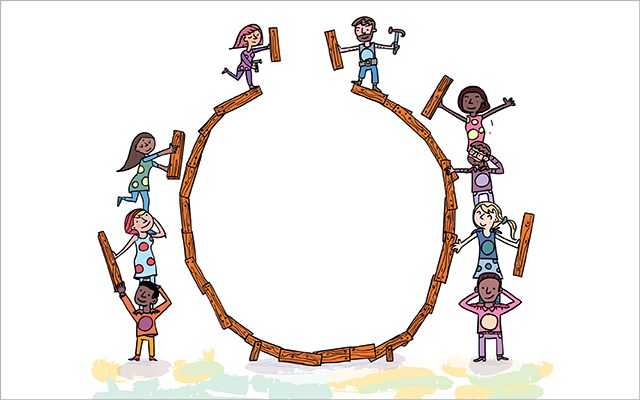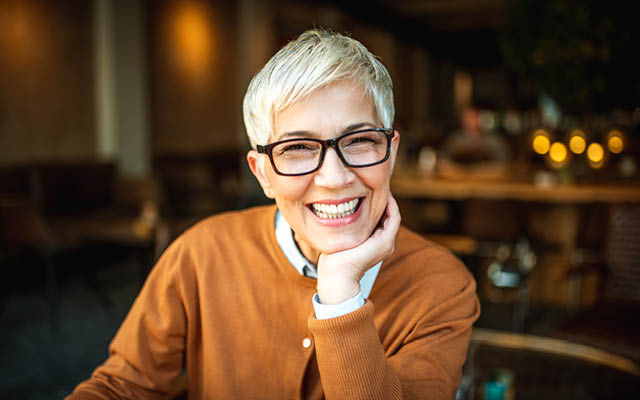Carrie Hadler was at a party in her adopted city of New Orleans when she started chatting with another guest. It turned out they both had Midwestern roots, and after a long bonding session over ice hockey, the two struck up a friendship. Their attraction wasn’t romantic, but they had great friendship chemistry — and still do. “We go for bike rides — normal friend stuff,” says Hadler. Normal, except that Hadler is 28 and her friend is 50.
If you scroll through your contacts, you’ll probably discover that most of your friends are roughly your age. That’s natural enough — many of our close friendships are forged in places like college or birthing classes that attract similar age groups. It’s less common that people form genuine friendships that span a generation.
But intergenerational friendships offer unique benefits. If Hadler has a relationship problem, for example, she turns to her older friend. “He has a lot of perspectives that I don’t,” she says. “He understands that life evolves. When you’re my age, everything is a much bigger deal because you don’t have as much to look back on.”
This contrast in perspectives can work both ways. In her late 30s, Theresa Carey faced a career dilemma. She’d left her law practice to teach at-risk junior high students, but a school reorganization soon put her back in the job market. It was a former student, 20 years younger, who gave her the courage to follow her passion for writing. “I wrote plays for the school,” says Carey, now 50. “I’d stayed in touch with a former student and he’s the one who said, ‘You’re so good at writing plays, why don’t you try that?’” His enthusiasm helped her believe in herself — and follow her dream.
“Younger people are still in the phase where they’re experimenting with life,” she says. “That’s contagious.” Today she’s completed several screenplays and won screenwriting competitions.
“There’s a beautiful reciprocity in these relationships,” says Irene S. Levine, creator of The Friendship Blog (www.thefriendshipblog.com) and author of Best Friends Forever: Surviving a Breakup With Your Best Friend. “Friendships with older folks help us see our own future and learn ways to enjoy the years that lie ahead. Younger people tend to have more energy, a sense of adventure and a greater willingness to try new things. Each friend can offer the other something different based on their station in life.”
Common Ground
The most important thing in cultivating an intergenerational friendship is to hold that friendship to the same standards as any other. “It doesn’t work to just walk into an assisted living center,” says Tom McBride, an English professor at Beloit College in Wisconsin and coauthor of The Mindset Lists of American History: From Typewriters to Text Messages, What Ten Generations of Americans Think Is Normal. “The key is to find something that you have in common.”
Often, however, discovering a shared interest requires getting past cultural differences. McBride helps teachers understand the cultural references of incoming freshmen. Those cultural differences can be a barrier to cross-generational friendships, he says. “One generation says LBJ and they’re talking about Lyndon Johnson. The other might be talking about LeBron James.”
Similar challenges are echoed by Jon F. Nussbaum, PhD, a professor at Penn State who researches intergenerational communication. “A lot of the stereotypes about temperament and generational differences are really true,” says Nussbaum, and that can lead to miscommunication.
With those differences in mind, you’re better prepared to dive in and look for interests that transcend age. “I grew up in Pittsburgh, where everybody’s a Steelers fan,” says Nussbaum. “That kind of shared enthusiasm can cut across age groups.” Likewise, passions like gardening, choir or community theater tend to minimize age-based differences.
Candelaria Silva-Collins found common ground with an older friend in her profession. A 58-year-old writer and arts marketing professional in Boston, Silva-Collins attended social gatherings where she regularly encountered an older couple — a museum director and his wife. “I would see them out at events and they seemed like a fantastic couple,” she says. So one evening Silva-Collins struck up a conversation with the director’s wife, now 70. Their shared interest in the arts formed their initial bond, but over time their friendship deepened. “She teaches me a lot about being vital and vibrant.” With common interests at their core, intergenerational friendships can blossom into rich, profoundly satisfying connections.
Timeless Bonds
For the younger half of an intergenerational friendship, access to the broader perspectives that come with age can be enriching. “Older people are less inclined toward hype and trendiness,” says McBride. “As a result, they have a more enduring sense of what’s important.”
Moreover, they’ve often experienced things younger folks simply haven’t yet. Silva-Collins witnessed an older friend’s coping with the death of a spouse, for example, and it prompted her to broach the subject with her own husband. “We started talking about ‘Where do you want to be buried, or do you even want to be buried?’ I’ve started a folder on it to help me later on.”
It’s helpful to realize that older friends don’t have all the answers, though. Silva-Collins was initially intimidated by the success of her older friend. When they grew closer, she saw that her friend still wrestled with her own share of questions. “She has a lot of wisdom, but she’s still figuring some things out, and that was comforting for me to see.”
Hanging out with pals in a different phase of life can also offer fresh opportunities for relating. “With friends my own age, I’m more likely to poke and joust, and to call them out on their stuff,” says Eric Utne, 66, the founder of Utne Reader magazine. While this “sparring” dynamic can be fun, he says, it can also keep the relationship from growing deeper.
With his younger friends, Utne says he feels less competitive and is more likely to really listen and offer the kind of genuine support that enriches a relationship.
“One key to intergenerational friendship is that you’re not downloading your infinite wisdom, but lending an ear,” says Utne, who recently launched a group that aims to bring baby boomers and Millennials together to focus on environmental issues.
For younger people, having an older friend listen closely helps them feel heard and respected, says Nussbaum. For older people, having younger friends can help them better connect to the broader culture. “Young people are more invested in media and pop culture, so communication with them keeps an older person engaged,” says Nussbaum. There’s evidence, too, he notes, that friendships with younger people can speed brain activity in older individuals, literally stimulating the mind in a way peer-to-peer communication doesn’t.
Both parties benefit from this kind of engagement, says McBride. “Looking at things through the eyes of people who have very different experiences and assumptions than you do can be like food for the brain,” he explains.
Theresa Carey, the screenwriter, agrees. Her friendships with both younger and older pals have given her deeper insight into her own experience. “My younger friends connect me to where I’ve been,” she says, “and my older friends connect me to where I’m going.”
Finding Good Friends — Young and Old
Before you can reap the rewards of intergenerational friendships, you have to cultivate them. And since most of us live surprisingly age-segregated lives, that can prove challenging. Here are some tips that can help you find and maintain social connections outside of your own age group.
- Extend your acquaintances. Consider whether there might be a potential pal among the individuals you already know casually, perhaps through family or work connections.
- Leverage lifetime activities. Religious groups, craft guilds, choirs, community gardens and clubs organized around shared, lifelong interests can be great places to meet new people of all ages who already share your passions.
- Don’t settle. As with any friendship, this one should be grounded in common interests and values. It’s best when there are rich rewards in it for you both.
- Stay open. Even if you share a terrific connection, both you and your differently aged pal may still need to do some thoughtful listening and nuanced communicating to bridge age-driven differences in social expectations and assumptions.




This Post Has 0 Comments